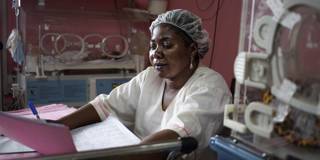Organizations advocating for improved public health around the world have fallen woefully short when it comes to addressing gender disparities, both in the work they do and in their own operations. Until this changes, progress toward goals for both public health and gender equality will suffer.
NEW YORK – Over the past few decades, the international community has tasked itself with achieving a wide range of social and environmental objectives, many of which are enshrined in the United Nations Sustainable Development Goals (SDG) for 2030.
We have advocated for many of these goals, as well as similar efforts that preceded the SDGs, because we believe that such collective projects are necessary to create the type of world we want for our children and grandchildren. But we have also come to realize that far too many efforts to fulfill global commitments lack the meaningful reporting mechanisms needed to succeed. If we are serious about translating lofty pronouncements into real progress for people and the planet, this will have to change.
Consider public health, an issue that affects everyone. The global agenda in this area determines the norms and standards that shape how public and private actors promote health, prevent disease, and administer care. It encompasses research initiatives and global public goods such as vaccines and emergency-preparedness programs for epidemic outbreaks. And it brings people together to work toward providing universal health coverage and ensuring everyone’s right to health.

NEW YORK – Over the past few decades, the international community has tasked itself with achieving a wide range of social and environmental objectives, many of which are enshrined in the United Nations Sustainable Development Goals (SDG) for 2030.
We have advocated for many of these goals, as well as similar efforts that preceded the SDGs, because we believe that such collective projects are necessary to create the type of world we want for our children and grandchildren. But we have also come to realize that far too many efforts to fulfill global commitments lack the meaningful reporting mechanisms needed to succeed. If we are serious about translating lofty pronouncements into real progress for people and the planet, this will have to change.
Consider public health, an issue that affects everyone. The global agenda in this area determines the norms and standards that shape how public and private actors promote health, prevent disease, and administer care. It encompasses research initiatives and global public goods such as vaccines and emergency-preparedness programs for epidemic outbreaks. And it brings people together to work toward providing universal health coverage and ensuring everyone’s right to health.